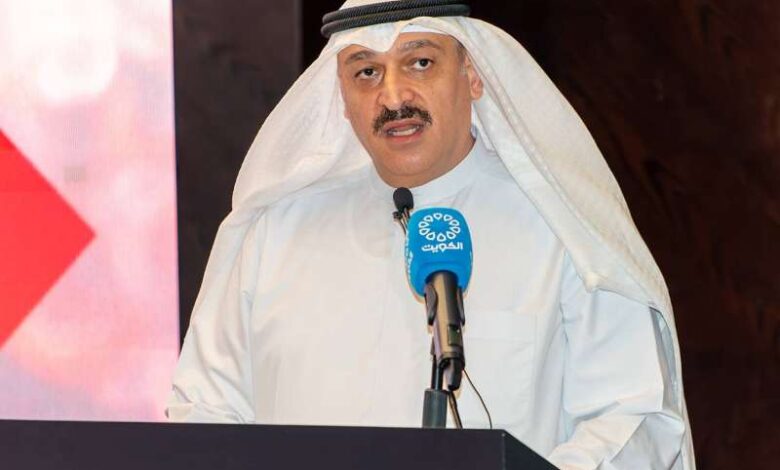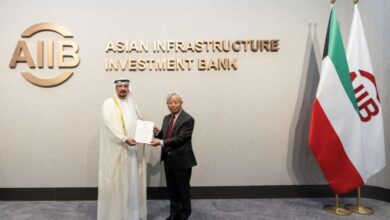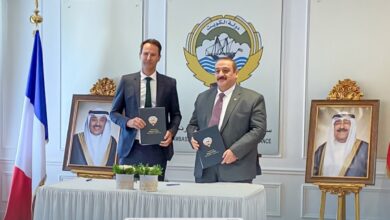Kuwait’s cutting-edge Cancer Control Center to open soon
The state-of-the-art facility will provide the latest treatments, devices, and foster the development of national medical professionals through training on the latest protocols.

-
The Kuwait Cancer Control Center, established in 1968, is dedicated exclusively to providing care for cancer patients across Kuwait.
-
The center boasts over 600 highly skilled employees in oncology and is outfitted with state-of-the-art medical equipment and services.
Dr. Ahmed Al-Awadhi, Kuwait’s Minister of Health, announced the imminent opening of the Kuwait Cancer Control Center in the Al-Sabah Health District. He mentioned that the center will feature state-of-the-art international equipment, including a device hailed as ‘the inaugural model in the Middle East.’
This statement was delivered by the Minister of Health to reporters on Friday, following the opening of the first forum of the Kuwaiti Leukemia and Lymphoma Society. The forum, which spans two days and includes local, Gulf, and international participants, marks an important event.
Minister Al-Awadhi emphasized in his statement the Ministry of Health’s commitment to leveraging capabilities in serving cancer patients. This includes providing the latest treatments, devices, and fostering the development of national medical professionals through training on the latest protocols. He highlighted ‘the significant role these efforts play in enhancing the quality of services provided’.
In a speech delivered during the forum’s opening, Minister Al-Awadhi explained that ‘lymphoma diseases constitute a significant portion of leukemia cases, accounting for 20 percent in men and 10 percent in women.’
He emphasized that the Ministry of Health prioritizes cancer treatment and the provision of cutting-edge therapies such as immunotherapy. Additionally, enhancing the overall healthcare system and improving the services offered are among the ministry’s key objectives.
He stated that this forum ‘is an educational event aimed at healthcare professionals specializing in blood diseases, leukemia patients, individuals in recovery, caregivers, and family members.’ Its purpose is to provide ‘insights into treatment options and current therapies.’
He stated that ‘cooperation and interaction with the forum’s agenda enhances the exchange of ideas in a scientific and practical manner and enriches the outcome of care providers,’ especially since the forum ‘will witness multiple lectures and direct discussions with patients presented by 21 lecturers from the United Kingdom, Italy, Germany, Canada, and the Gulf countries.’
He pointed out that the forum will discuss several topics, the most important of which are ‘first-line treatments for lymphoma,’ ‘the importance of molecular nuclear scanning in treating lymphoma,’ ‘diagnosis and treatment of acute and chronic leukemia,’ ‘plasma cell disorders,’ and ‘the status of cellular therapies in Kuwait,’ along with techniques that have positively changed the treatment approach.
For his part, Dr. Abdul Aziz Hamada, Head of the Hematology Department at the Kuwait Cancer Control Center and President of the Kuwait Leukemia and Lymphoma Society, stated in a similar speech that the forum witnesses the organization of scientific lectures on blood diseases with the participation of doctors and specialists from the Gulf countries, Europe, and North America.
He added that the forum will feature the organization of two workshops for nursing staff, presented by an expert in the field. Additionally, there will be workshops and lectures for hematologists and laboratory technicians, as well as four discussion panels directed at the center’s workers and the public interested in blood diseases. These panels will facilitate discussions about patients’ experiences, alongside sessions led by nutrition and mental health doctors.
Dr. Fatima Khadada, the hematology specialist and head of the forum, stated, “The forum’s concept is rooted in the partnership between doctors and patients, focusing on scientific sessions in the morning followed by workshops and discussions on psychological and nutritional aspects with patients.”
Khadada added that the second day of the forum, which is tomorrow, will feature discussion sessions on the latest treatments, specifically cell therapy and coping strategies with the disease.
Abdulaziz Al-Marzouq, a Board member of the Kuwait Leukemia and Lymphoma Society, noted the society’s recent establishment aims to raise awareness about early blood cancer diagnosis and modern treatments. Their goals include improving healthcare quality, creating psychological and social support programs, and forming a volunteer association, seeking expertise in various fields.
He emphasized that the association aims to offer comprehensive awareness programs that contribute to educating the community, supporting specialized research in treating blood cancer, developing effective and safe treatments, and establishing strategic partnerships with medical and research institutions to exchange knowledge and expertise in this vital field.
He also emphasized the commitment to support the Patient Registry project for the Hematology Department at the Kuwait Cancer Control Center and establish an ongoing registry for patients undergoing leukemia, lymphoma, and bone marrow transplantation. Additionally, there’s a drive to promote the adoption of new treatments like cellular therapies in Kuwait over the next five years.
The Kuwait Cancer Control Center, established in 1968, is a government institution under the Ministry of Health. It comprises the Hussein Makki Al-Juma Center for Specialized Surgery, the Sheikha Badriya Al-Sabah Center for Oncology, and the Faisal Sultan Bin Issa Center for Diagnostic Radiology.
This center is dedicated exclusively to providing care for cancer patients across Kuwait. It boasts over 600 highly skilled employees in oncology and is outfitted with state-of-the-art medical equipment and services.













